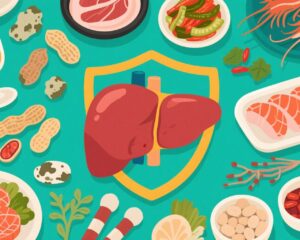Introduction
Aging is an inevitable process that affects every part of our body, from organs to cells. Yet, new research sheds light on the roles of the brain and immune system in determining how gracefully and healthily we age. A landmark 2025 study published in Nature Medicine involving 45,000 participants reveals that maintaining “youthful” states in both brain and immune functions dramatically lowers the risk of death — by as much as 56%. This discovery highlights two critical targets for anti-aging strategies, emphasizing the importance of lifestyle habits that protect our brain and immune defenses. This article explores the scientific findings, common misconceptions, harmful behaviors, and practical steps everyone can take to nurture these vital systems for longevity and better health.
Scientific and Clinical Evidence: The Two Key Players in Longevity
The 2025 study involved large-scale proteomic analysis, measuring protein patterns in blood samples to estimate the biological ages of 11 major body organs and systems, including the brain, heart, liver, and immune system. Biological age represents the functional status of tissues, which may differ significantly from chronological age, reflecting how “young” or “aged” these systems truly are.
Researchers found a compelling correlation: as the number of accelerated aging organs increased, so did mortality risk. Individuals with 2 to 4 organs aging faster had a 2.3-fold increase in death risk, while those with 8 or more accelerated aging sites faced an 8.3-fold increase.
However, the intriguing nuance was that simply having many “young” organs didn’t guarantee longer survival. Instead, only two body parts—
- The Brain: Participants with a biologically “young” brain had a 40% reduction in death risk.
- The Immune System: Those whose immune systems remained youthful showed a 42% decreased likelihood of death.
Most strikingly, participants with both a young brain and young immune system exhibited a 56% lower mortality risk, underscoring these two systems as key anchors of longevity.
Harmful Behaviors: What Damages Your Brain and Immunity?
Understanding what harms these vital systems is essential to counteracting aging effectively. Here are some detrimental habits and factors to avoid.
Immune System Saboteurs
1. Unhealthy Diet: Excessive salt intake disrupts gut microbiota, impairing immune cells’ bacteria-fighting abilities. Adults should limit salt to 5 grams daily.
Excessive added sugar intake disturbs immune regulation, weakening defenses. The recommended maximum added sugar consumption is 50 grams per day, ideally under 25 grams.
Inadequate water intake hampers toxin elimination and body function, causing immune decline. Healthy adults should consume about 1500–1700 ml of fluids daily, favoring plain water and small sips throughout the day.
2. Insufficient Sleep: Sleep is crucial for immune restoration; poor sleep decreases immune factors. Chronic restriction to 4 hours per night halves immunity compared to adequate sleep.
3. Lack of Physical Activity: Sedentariness reduces immune efficiency and heightens risks for cancers like colorectal cancer by about 44%.
Brain-Aging Accelerators
1. Overeating Per Meal: Eating until full stretches brain arteries, promoting atherosclerosis, early brain aging, and cognitive decline. It’s advisable to eat moderately, about 70-80% full, prioritizing fresh foods and limiting processed meats.
2. Chronic Sleep Deprivation and Night Owl Habits: Persistent sleep loss accelerates neuron decay, causing earlier brain degeneration. Going to bed before 23:00 and sleeping at least 7 hours is optimal. Avoid covering your head while sleeping to prevent brain oxygen deprivation.
3. Smoking and Excessive Alcohol: Nicotine directly damages neural cells, diminishing cognition over time. Alcohol impairs central nervous system function, slowing responses, especially with overuse.
Healthy Habits: How to Keep Your Brain and Immunity Young
Practicing proactive and healthy behaviors can protect and rejuvenate your brain and immune function. Here are three recommended habits for each system.
Three Habits to Boost Immune Health
1. Balanced Diet: Include four main food groups daily — grains and tubers, fruits and vegetables, protein (emphasizing quality sources), and healthy fats (including cooking oils and nuts). Aim for more than 25 different foods weekly to ensure nutritional balance.
2. Regular, Sufficient Sleep: Maintain a consistent schedule with bedtime before 23:00 and a full 7+ hours of restful sleep to facilitate immune factor synthesis.
3. Moderate Physical Activity: Avoid prolonged sitting. Engage in exercise at least five times a week for 30 minutes or more. If new to exercise, begin with walking.
Three Habits to Nurture Your Brain
1. Mental Stimulation: Keep your brain engaged through reading, puzzles, learning new skills, or social interactions to expand cerebral blood flow and nutrient delivery, supporting brain health.
2. Brain-Healthy Nutrition: Eat foods rich in unsaturated fatty acids, antioxidants, proteins, and fiber, such as eggs, fish, nuts, green leafy vegetables, and soy products.
3. Finger and Brain Exercises: Simple hand and finger motor activities stimulate neurological pathways and can help delay cognitive decline.
Case Scenario: John’s Journey to Brain and Immune Vitality
John, a 60-year-old accountant, noticed increasing forgetfulness and recurrent colds over two years. Concerned about aging effects, he attended a wellness checkup where tests indicated accelerated aging markers in multiple organs but identified his brain and immune systems as particularly vulnerable.
Following guidance, John reduced salt and sugar intake, committed to 7 hours of nightly sleep, increased daily water intake, exercised by brisk walking five times weekly, limited processed meat consumption, and engaged in daily crossword puzzles and finger exercises.
After 12 months, John’s cognitive clarity improved, he experienced fewer infections, and follow-up biomarker tests reflected a youthful shift in his brain and immune biological age, greatly lowering his health risks.
Conclusion
Groundbreaking evidence highlights that maintaining youthfulness in the brain and immune system substantially lowers the risk of death and promotes longevity. Rather than merely focusing on general aging markers, attention to these two vital systems yields the most profound benefits. Avoiding excess salt, sugar, sleep deprivation, overeating, smoking, and inactivity while adopting balanced nutrition, sufficient sleep, exercise, mental engagement, and brain-friendly foods forms a practical roadmap to healthier aging. By nurturing brain and immune vitality, anyone can increase their chances of living a longer, healthier life.
References
1. Lehallier B, Shokhirev MN, Wyss-Coray T, Johnson AE. 2025. Data-driven analysis of biological aging across organ systems. Nature Medicine.
2. Choi KM, Lee J, Kim Y. Impact of Sodium Intake on Gut Microbiota and Immunity. Journal of Clinical Nutrition. 2023;112(4):789–798.
3. Irwin MR. Sleep and immune function. Handbook of Brain Sleep and Immunity. 2020;123–143.
4. Pedersen BK, Saltin B. Exercise as medicine – evidence for prescribing exercise as therapy in 26 different chronic diseases. Scandinavian Journal of Medicine & Science in Sports. 2015;25(Suppl 3):1–72.
5. Serafini M, Lajolo FM, Cueva C. Phenolic compounds and the modulation of brain aging. Nutrition & Aging Research. 2024;47(2):120–131.



